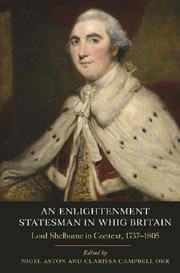Book contents
- Frontmatter
- Contents
- List of Illustrations
- List of Contributors
- Acknowledgements
- List of Abbreviations
- Introduction
- Part One Family, Piety, and Finance
- Part Two Politics
- Part Three The Bowood Circle Revisited
- 9 ‘Opening the Door to Truth and Liberty’: Bowood's French Connection
- 10 Lord Shelburne's Constitutional Views in 1782–3
- 11 Jeremy Bentham at Bowood
- 12 Shelburne and Perpetual Peace: Small States, Commerce, and International Relations within the Bowood Circle
- Index
- STUDIES IN EARLY MODERN CULTURAL, POLITICAL AND SOCIAL HISTORY
12 - Shelburne and Perpetual Peace: Small States, Commerce, and International Relations within the Bowood Circle
from Part Three - The Bowood Circle Revisited
Published online by Cambridge University Press: 05 September 2013
- Frontmatter
- Contents
- List of Illustrations
- List of Contributors
- Acknowledgements
- List of Abbreviations
- Introduction
- Part One Family, Piety, and Finance
- Part Two Politics
- Part Three The Bowood Circle Revisited
- 9 ‘Opening the Door to Truth and Liberty’: Bowood's French Connection
- 10 Lord Shelburne's Constitutional Views in 1782–3
- 11 Jeremy Bentham at Bowood
- 12 Shelburne and Perpetual Peace: Small States, Commerce, and International Relations within the Bowood Circle
- Index
- STUDIES IN EARLY MODERN CULTURAL, POLITICAL AND SOCIAL HISTORY
Summary
Providing an intellectual identity for William Petty, 2nd Earl of Shelburne and his Bowood Circle, has become something of a parlour game for interested historians. The first problem is Shelburne's character. How could someone with such an antagonizing personality sustain a coherent group of any kind? Edmund Burke's comments about Shelburne's character in public and in private were vitriolic, but widely seconded by many who came into contact with him. Shelburne was likened to Gabriel Malagrida, the plot- ting Portuguese Jesuit who was found guilty of involvement in a plot to assassinate King Jose I at Lisbon in 1758. It is significant that such a characterization was traced back to Shelburne's sometime friend John Wilkes. The second problem is that when the range of possible members is considered, it becomes easy to find divisions. A further difficulty is that members of Shelburne's entourage often themselves had interests in other political groupings of the time, and sometimes in consequence supplied conflicting advice concerning political conduct. A final difficulty is that Shelburne was notoriously vague in self-expression. The best-known example concerned British relations with North America. Shelburne considered himself a friend to North America but avowed on numerous occasions his opposition to the independence of the United States. When he finally accepted the inevitability of separation his self-justifications and tortuous claims to have been consistent amused his enemies and confused his friends.
- Type
- Chapter
- Information
- An Enlightenment Statesman in Whig BritainLord Shelburne in Context, 1737–1805, pp. 249 - 274Publisher: Boydell & BrewerPrint publication year: 2011



